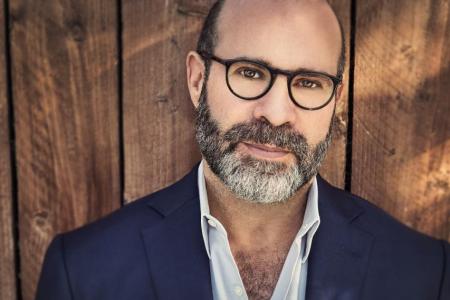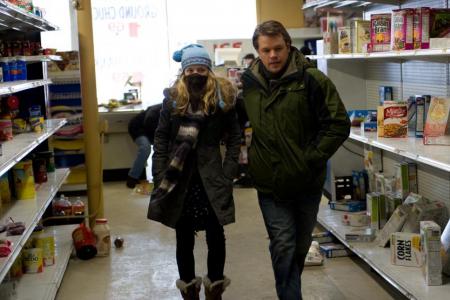Contagion screenwriter on how the world ended up living out the movie
Screenwriter of 2011 movie Contagion frustrated over how poorly prepared the US was for a pandemic
Back in 2011, US screenwriter Scott Z. Burns sent a script to Hollywood actor Matt Damon with a note attached that said: "Read this and then wash your hands."
The script was for the 2011 movie Contagion, a star-studded thriller featuring the likes of Damon, Kate Winslet, Gwyneth Paltrow, Marion Cotillard, Laurence Fishburne and Jude Law which is picking up popularity again, becoming one of the most downloaded films due to the Covid-19 pandemic.
Directed by Steven Soderbergh, Contagion is prescient, with a plot - a lethal virus caused by transmission from bats to humans affecting the human respiratory tract and causing infection and death - that is mirrored by today's headlines.
There is a race for a vaccine as panic sweeps the world, cities are locked down, there is disinformation everywhere and riots ensue.
When the Hollywood Foreign Press Association requested an interview with Burns, he asked that the expert consultant on Contagion, world-renowned epidemiologist W. Ian Lipkin, also be present.
The 58-year-old writer behind The Bourne Ultimatum (2007), The Informant! (2009) and the upcoming James Bond movie No Time To Die said: "The rule I have now is I won't do anything like this without a scientist, because we are not promoting a movie. I am proud of (Contagion), but if I can use that movie and my position to give Ian and other scientists some space to tell people what needs to happen, that is all that is important to me right now."
Burns' father was a scientist and often expressed his worries about infectious viruses to his son, so the topic was always in the back of Burns' mind. As was the 1995 medical disaster movie Outbreak, which he saw as a young man.
Burns said in our teleconference from his home in Los Angeles: "Something about the end of that movie and the science involved always made me feel uncomfortable.
"I remember thinking I wanted to make a pandemic movie, but I wanted to be guided by the latest science. I wanted to be informed now by a world that is committed to globalisation and travel, and we have great income disparity. The day that we wrapped The Informant!, I remember Steven coming to me and saying, 'What do you want to do next?' And I pitched him (Contagion) and I got halfway through and he said, 'I'm in.'"
DEEPLY FRUSTRATED
Burns is not surprised he is living out the movie in real life today.
"Having been friends with Ian now for a decade, I am aware of his work on Sars (severe acute respiratory syndrome) and Mers (Middle East respiratory syndrome). Am I surprised that we are seeing more and more viruses coming into contact with humans? Not at all.
"This is connected to larger problems of human beings invading spaces that were occupied by animals. Our behaviour is behind some of these things. I am deeply, deeply frustrated like Ian that there were so many smart people who worked hard ringing this alarm bell for 20 years and if anything, this country has gone backwards," he said.
Not surprisingly, Burns has been in demand for interviews recently since the appearance of the coronavirus.
On why Contagion has struck such a chord, he said: "It is very, very science-based. It isn't some sort of conspiratorial bulls*** about a virus coming from a lab or cellphone tower. So, did I know it was going to happen 10 years later? No. But every expert I spoke to said it wasn't a matter of if, but when."
Dr Lipkin - calling in from Columbia University in New York where he is professor of epidemiology, neurology and pathology - explained that not enough diagnostic testing has been done in the US, where cases are approaching the 1 million mark, with over 54,000 deaths.
The 67-year-old, who is also director of the Centre for Infection and Immunity, had announced in late March that he had tested positive for Covid-19.
He recalled that it was an extremely unpleasant experience, with high fever, a cough that lasted two weeks, lethargy, fatigue, shortness of breath, and one of the worst headaches he had ever had.
"There was a period when you feel a little bit better, and then there is some recrudescence, which is when the immune system kicks in and you have this exaggeration of kinds of molecules that make you feel sick that are typically associated with fever and lassitude.
"And that period, which is eight to 10 days in, is when some people dip and wind up in ICU having difficulty breathing. Fortunately, I came through all of that and I am theoretically now immune."
MOVIE POWER
Dr Lipkin has been all over TV sharing his expertise and actually uses some clips from Contagion to make his points.
"I have a three-minute version of the film that highlights what I consider to be the most important elements when I am giving a talk on public health. People walk away with a deeper understanding.."
In the meantime, he does not see a return to normalcy any time soon unless "we can flatten the curve (with isolation), improve testing, and accelerate the advancement of drugs and vaccines".
His best guess is that the vaccine is about a year away.
As for the rise of disinformation that is inevitable in this Internet age, Burns thinks it is worse than what he had envisaged in Contagion.
A subplot the movie involves a conspiracy theorist (played by Law) who posts a video falsely claiming he cured himself of the virus using a homeopathic cure derived from forsythia, leading to panic buying of forsythia.
Burns said: "It is not just bloggers. Unfortunately, now it is also people in the federal government. Ian will probably agree that it is hard enough fighting the disease, but to also fight misinformation that is relying on xenophobia and incredible political divides that have existed in this country before this thing happened, makes the job of someone like Ian incredibly difficult."
But there is some hope amid all the bad news, said Dr Lipkin.
"It is not the first pandemic and it is not going to be the last. I am not even sure it is going to be the worst. If you look at the frequency with which these outbreaks occur, it seems to be increasing in the order of every three to five years.
'So I am hoping that people will carry forward the lessons of the wild animal markets, data sharing and improvements for platforms of vaccines, so that when the next one comes, we will be in better shape."
The writer is the chair of the board of directors of the Hollywood Foreign Press Association, a non-profit organisation of entertainment journalists that also organises the annual Golden Globe Awards.
Get The New Paper on your phone with the free TNP app. Download from the Apple App Store or Google Play Store now




